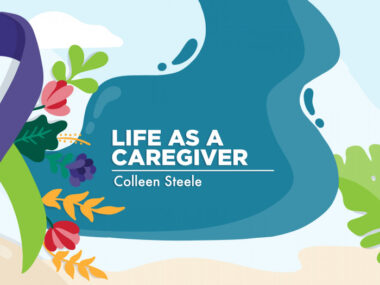I’ve discovered a new tool to avoid triggers: ‘glimmers’
They're like an antidote to some events that spark my anxiety
Written by |

Earth spins at approximately 1,000 miles per hour and orbits the sun at a mind-blowing 67,000 miles per hour. Doesn’t it feel like life on this planet picks up speed each year, as if we’re all trying to live faster than the world can turn?
There are places to be, things to do, expectations to meet, and information to absorb from technology urging us to keep up with its pace. It’s no wonder that “triggered” has become a catchword.
But pulmonary hypertension (PH) patients and caregivers can tell you from experience that the emotional, mental, and physical reaction to triggers created by trauma is way more intense and life-altering than the sting of hurt feelings or tripping over life’s little speed bumps.
Triggered by the push of a button
My 25-year-old son Cullen was diagnosed with PH in 2008 and received a heart and double-lung transplant in 2014. My husband, Brian, became ill and passed away in 2023. I lovingly poured my heart and soul into caring for both of them, but to say I don’t struggle with triggers from that trauma would be a lie. I shared some of these triggers in my column “How PTSD Has Affected My Self-care.”
I thought I knew all my triggers and how to avoid them (when I can) or deal with them (when I can’t). But since I began caring for my elderly parents, a new one has surfaced.
Mom and Dad, who are hard of hearing, watch television at full volume but mute it during commercials. I prefer the TV constantly blaring rather than dealing with the jump-scare I experience every time it’s unmuted. My reaction is the same even when I’m expecting the sound. I hold my breath, clench my fists or wring my hands, and feel my heart rhythm change. I thought it was just an annoyance, but I’ve come to recognize it as anxiety.
Long-term caregiving has made my ears hypersensitive to distress, and my mind is fooled by this every time the room goes from quiet to loud. To make matters worse, the sounds are often chaotic because my parents only watch the news and Westerns. Watching television with them puts me on edge and in emergency-response mode.
Blocking out triggers with my glimmers
Recognizing my triggers has been easier than learning how to control them, and they’re even harder to avoid. I recently watched a video in which a new catchword, “glimmers,” was used. I researched it and discovered that it’s the opposite of triggers and has real therapeutic worth.

A picturesque sky is one of Colleen Steele’s new go-to “glimmers.” (Photo by Colleen Steele)
An article from USA Today provides background on this term: “Coined by Deb Dana, a licensed clinical social worker who specialized in complex trauma, in her 2018 book ‘The Polyvagal Theory in Therapy,’ ‘glimmers’ refers to small moments when our biology is in a place of connection or regulation, which cues our nervous system to feel safe or calm.”
The article explains that “glimmers aren’t just tiny moments that bring joy or happiness, they can also spark ease, relaxation, safety, connection or a feeling that the world is OK even for a fleeting moment.”
Examples of glimmers from the article happen to work specifically for me. Every Sunday, I enjoy listening to my “favorite songs” playlist when I drive to church. I arrive early and am greeted by the joyous sound of church bells. Weather and time permitting, I stop at a park on my way home to enjoy the peace I experience when watching the sky.
I’m grateful for strangers who offer a smile. I find it soothing to hear a loved one’s voice and feel comforted by my furry friend, Maddie, whom I might have named Glimmer if I’d been introduced to the term sooner. Instead, I’ve named my headphones. When I feel triggered by the changing volume of the television, I put on my “Glimmers” and listen to music or a podcast. This way I can still share a room with my parents without feeling like I need to jump to their aid.
Using glimmers as a caregiving tool
As a caregiver, I pay close attention to the triggers of those I’m caring for and what works best to ease their emotional, mental, and physical discomfort. Glimmers are what often help me help them.
My mom is also calmed by listening to her favorite songs, and Dad enjoys the companionship of Maddie, the cat, as much as I do. Glimmers often work best when shared.
I invite you to comment below to share which glimmers comfort you.
Note: Pulmonary Hypertension News is strictly a news and information website about the disease. It does not provide medical advice, diagnosis, or treatment. This content is not intended to be a substitute for professional medical advice, diagnosis, or treatment. Always seek the advice of your physician or other qualified health provider with any questions you may have regarding a medical condition. Never disregard professional medical advice or delay in seeking it because of something you have read on this website. The opinions expressed in this column are not those of Pulmonary Hypertension News or its parent company, Bionews, and are intended to spark discussion about issues pertaining to pulmonary hypertension.




Leave a comment
Fill in the required fields to post. Your email address will not be published.